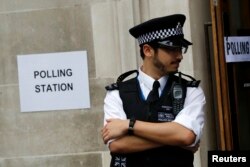What's driving the split
Surveys on Britain's EU referendum have brought to the surface some of the issues that are driving the opposing camps in Thursday's vote.
An Ipsos MORI poll revealed that economic and immigration concerns were among those British voters rated as "very important" in helping them decide how to vote. What the poll also showed was that on these issues the leanings of 'Remain' voters were diametrically opposed to those of their 'Leave' counterparts.
For instance, the impact of a Brexit on the British economy was of great concern for 'Remain' voters (42 percent), while it seemed not much of a priority for 'Leave' voters (18 percent), according to the poll.
The contrast was even greater on immigration, with 'Leave' voters strongly opposing the EU's open border policies and resulting influx of immgrants (52 percent), while for 'Remain' voters the issue was less of a concern (14 percent).
The survey also revealed a generational split, with the majority of voters aged 18-34 strongly in favor of Britain remaining in the EU. Voters aged 35 to 54 were almost evenly divided on the issue, while a majority of voters 55 and older favored leaving the bloc.
Scotsman former editor Bill Jamieson says #Brexit battle has “exacted high price" in terms of divisions; a Remain result won't end the war
— Jamie Dettmer (@jamiewrit) 23.6.2016
Thurs is post-work socialising night in Brussels. Many told @VOANews v worried over #Brexit. EU economy big concern https://t.co/TxCzRhgcJu
— Henry Ridgwell (@HenryRidgwell) 23.6.2016
Five hours to go
There is no love lost between the top 'Remain' and 'Leave' campaigners with just five hours left in voting. A 'Vote Leave' official, Matthew Elliot, has rounded on Londoners and the Scots in a bid to get anti-EU English voters in rural areas, the north and the Midlands to get out and vote.
In an email to potential Brexit supporters, Elliot warned: “There is a very real chance that voters in London and Scotland will vote to keep us in the EU today despite the heartlands of the country voting to leave.”
London Labor lawmaker and pro-Europe campaigner Chuka Umunna has responded: “Vote 'Leave' are ending this campaign as they began it – by seeking to divide our country not unite it, turning regions, nations and communities against one another. Londoners and Scots have as much right to exercise their democratic choice as anyone else.”
With both camps jittery and no one sure which way this will go, bookmakers William Hill say that odds have shortened on the tough-willed Interior Secretary Theresa May becoming Prime Minister, succeeding David Cameron, in the event of a Brexit.






